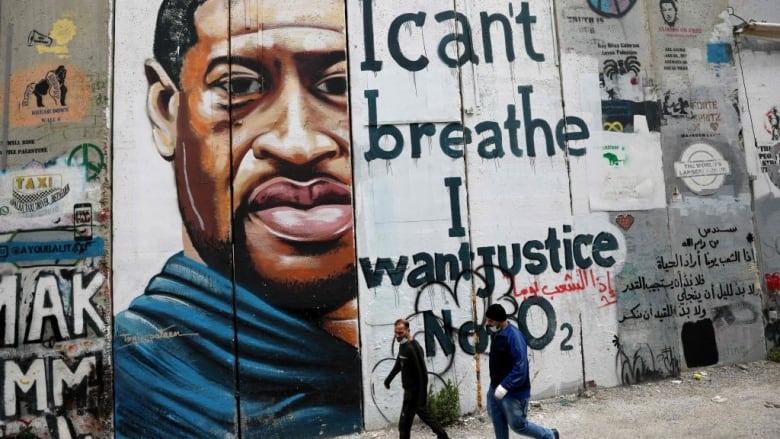Montrealers relieved after conviction in George Floyd's death, but say fight for reform far from over
'I was very prepared, emotionally and mentally, to have to explain why justice was not served,' advocate says

Tiffany Callender did not expect Derek Chauvin to be convicted.
As the former police officer's trial inched closer toward a verdict, she was mentally prepared to explain to her daughter why she believed the justice system once again dropped the ball in the case of a Black man being killed by police.
In the end, that conversation did not have to happen.
"Shock," said Callender when summing up her reaction to the verdict.
"Which is really disturbing, but it kind of indicates the trauma that we internalize as people of colour when dealing with the justice system. I am so relieved that I can speak to my children today and my family and say that justice has been served."
Chauvin, a white, former Minneapolis police officer was convicted Tuesday of second-degree unintentional murder, third-degree murder and second-degree manslaughter in the death of George Floyd.
Last May, Chauvin pressed his knees on Floyd's neck and back for more than nine minutes as two other officers held him face-down on the pavement while he was handcuffed.
Floyd's death triggered a wave of protests around the world, including here in Montreal. Downtown demonstrations drew tens of thousands of people.
People were angry, fed up. Floyd's death became a symbol of systemic racism.
Advocates in the city say the verdict brought them a sense of relief.
"Despite the fact that this is one specific case, although it does not equal true justice — it's just one verdict — it still sends an important symbolic message to everyone throughout the world, beyond the U.S., that criminal justice systems can be systems of equality and true justice," said Balarama Holness, the founder of the group Montreal In Action.
"It does give a sign of hope for many people that felt the criminal justice system was never on their side."
For Holness, Callender and others, the trial's verdict is a major victory. It's also motivation to keep pushing for reform, including here at home.
'We are human'
In 2018, Holness's group spearheaded a public consultation on systemic racism in Montreal.
What followed was a scathing report, slamming the city and Montreal police on several fronts, including racial profiling.
The report was tabled just a few weeks after George Floyd's death.
Mayor Valérie Plante has complied with the report's top recommendations: She publicly acknowledged the existence of systemic racism in the city, and she appointed Montreal's first anti-racism commissioner.
"Most of the action has been administrative," Holness said. "But we have not seen the change in terms of data."
Montreal police unveiled a policy on street checks, intended to eliminate racial profiling from its ranks. For many observers, the policy was underwhelming.
In light of Chauvin's conviction, Holness say it's time for Montrealers to apply more pressure on the city's administration until they see proof that things are changing.
In a statement, a spokesperson for Mayor Valérie Plante, said George Floyd's murder "allowed us to become completely aware of the systemic biases and the racism that exists in our society."
Several other recommendations from the report on systemic racism are being implemented, and the city is determined "more than ever" to fight systemic racism, including within the SPVM, the spokesperson said.
In 2019, a report from three independent researchers found that Indigenous people and Black people were four to five times more likely than white people to be stopped by police.
Earlier this year, the SPVM came under fire for the wrongful arrest of Mamadi Ill Fara Camara.
The 31-year-old Black, PhD student witnessed an attack on a police officer and alerted authorities, only to find himself detained for six days, charged with disarming and assaulting a police officer.
"At the local and municipal level, [we need] concrete action to mitigate and remedy social and racial profiling because that's really where it starts," Holness said.

Callender says the people who have devoted much of their time and energy to voicing their concerns and outrage will continue to do so.
But if the Chauvin verdict is to become a turning point, she says those advocates will also need help.
"The issue is the people who are victims of this are exhausted. We are human. So keeping up these fights, and this momentum and this pressure to keep this very real thing to us visible to the rest of the world is what is challenging," Callender said.
"People who consider themselves as allies, but more than that, you consider yourselves accomplices in change, this is where we need them to step up and take a lap for us. This is when people have to decide what their values are and what type of society they [want to] live in."
For more stories about the experiences of Black Canadians — from anti-Black racism to success stories within the Black community — check out Being Black in Canada, a CBC project Black Canadians can be proud of. You can read more stories here.

With files from Sharon Yonan Renold